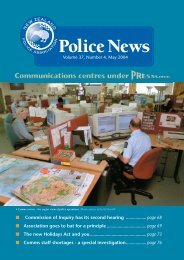Police News June 09.indd - New Zealand Police Association
Police News June 09.indd - New Zealand Police Association
Police News June 09.indd - New Zealand Police Association
You also want an ePaper? Increase the reach of your titles
YUMPU automatically turns print PDFs into web optimized ePapers that Google loves.
<strong>New</strong> <strong>Zealand</strong> <strong>Police</strong> <strong>Association</strong>Organised crime “biggest threat tolaw and order in <strong>New</strong> <strong>Zealand</strong>”<strong>Police</strong> officers have sent a chillingmessage to the nation’s leaders:organised crime now presents the singlebiggest threat to law and order in <strong>New</strong><strong>Zealand</strong>.The <strong>Police</strong> <strong>Association</strong> Members’ Survey,conducted by Nielsen and completedby more than 5,500 serving <strong>Police</strong>employees, asked members: “Whatdo you believe is the most significantthreat to law and order emerging in <strong>New</strong><strong>Zealand</strong>?”A massive forty-one percent (41%)identified gangs, organised crime, and/orthe gang-controlled methamphetamineand drugs trade as the most significantthreat. Concern amongst CIB staff waseven higher (50%).The huge concern about the emergingthreat of gangs and organised crime faroutstripped the next biggest concernsfor frontline police, which were aboutthe effectiveness of the courts and justicesystem (12%), and the threats posed byincreasing violence (6%).Warning cannot be ignored<strong>Police</strong> <strong>Association</strong> Greg O’Connor saidthe survey results are a warning that<strong>New</strong> <strong>Zealand</strong> cannot afford to ignore.“<strong>Police</strong> are on the frontline dealing withcrime, so we always see the emergingissues long before they explode intopublic and political consciousness.“Frontline police, through the<strong>Association</strong>, warned about theemergence of P more than 12 years ago.Unfortunately, it was literally yearsbefore <strong>Police</strong> at national headquarterslevel, and their political masters, tookthe threat seriously. By that time, as weall now know, the horse had bolted,”Mr O’Connor said.“The fact police are so much moreconcerned about organised crime thanviolence, even though the increasein threats, assaults, and – tragically –deaths of police officers is undeniable,just goes to show how serious this issuehas become.”The serious threat now posed bycomplex and entrenched organisedcrime is largely a consequence of afailure to attack the methamphetaminetrade early, according to Mr O’Connor.“The amount of money derived fromdealing P means the gangs have gotricher, smarter, and better organised.They are now firmly focussed ondiversifying their business, andbroadening their sphere of influenceinto the nice end of town, where theopportunities to keep growing theircriminal wealth are that much greater,”he said.Legislation tackling“yesterday’s issues”Last month, Parliament passed theWanganui District Council (Prohibitionon Gang Insignia) Bill, which will allowthe District Council to ban gang regaliafrom designated areas in Wanganui (seeseparate story on page 116).Also in May, the <strong>Police</strong> <strong>Association</strong>made submissions to Parliament’s Lawand Order Select Committee, which isconsidering the Government’s Gangsand Organised Crime Bill. This Billmakes minor changes to provisionsaround section 98A of the CrimesAct (the offence of ‘participation inan organised criminal group’), use ofelectronic interceptions in investigatingthe offence, and provisions allowinglocal councils to tear down ‘intimidating’structures such as gang fortifications.Mr O’Connor said these measures, while“nice to have”, will make little differenceto gangs and organised crime.“None of these measures will haveorganised criminals shaking in theirboots. The reality is, gang patches andfortified pads are largely yesterday’sissues. While there are still somechapters who are a bit slow to workit out, particularly in provincial <strong>New</strong><strong>Zealand</strong>, most gangs have realised thatpublic and police attention is simplybad for business. The smart criminalshave already taken off their patches.They have already moved their majoroperations into the ‘leafy suburbs’, andit will take more than tinkering withanti-gang legislation to root them out,”Mr O’Connor warned.‘Home bake’ heroin comebackOne side effect of organised crime’sgrip on the drugs trade appears tobe the re-emergence of ‘home bake’heroin.Since its peaks in the 1970s and 80s,heroin has been a relatively minorproblem in <strong>New</strong> <strong>Zealand</strong>. Sourceshave told <strong>Police</strong> <strong><strong>New</strong>s</strong> that some drugusers, anxious to escape the threats,debts and violence associated withorganised crime’s ruthless grip onthe supply of methamphetamineand other drugs, are now turningback to home bake.Some pharmacists spoken to by<strong>Police</strong> <strong><strong>New</strong>s</strong> confirmed there has been asharp increase recently in the number ofapparent pill shoppers trying to obtaincodeine-based products, which can be‘baked’ into a form of morphine andthen converted into heroin.Home bake was last a major featureof the <strong>New</strong> <strong>Zealand</strong> drug scene in the1980s; after the dismantling of the ‘MrAsia’ syndicate saw imported heroinsupplies dry up.According to a paper by K.R Bedfordand others, published in ForensicScience International magazine in1987, “The first laboratory using theprocess was seized in Auckland inJanuary 1983. In the three yearswhich followed to January 1986,Auckland police alone seized over50 such laboratories…and over90 were seized in NZ as a whole.Laboratories have been encounteredin kitchens and bathrooms in mostparts of the country.”In the 1987 paper on the topic,Bedford described the process asa “simple recipe-like procedure”where heroin is “normally made insmall batches for the addict's ownuse”.<strong>June</strong> 2009117

















